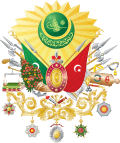
Back ثقافة عثمانية Arabic Kultur des Osmanischen Reichs German فرهنگ در امپراتوری عثمانی Persian Culture de l'Empire ottoman French Budaya Kesultanan Utsmaniyah ID Cultura dell'Impero ottomano Italian Osmaņu impērijas kultūra Latvian/Lettish Османлиска култура Macedonian Kebudayaan Uthmaniyyah Malay Kultura Osmanskega cesarstva Slovenian
| Culture of the Ottoman Empire |
|---|
 |
| Visual arts |
| Performing arts |
| Languages and literature |
| Sports |
| Other |
The culture of the Ottoman Empire evolved over several centuries as the ruling administration of the Turks absorbed, adapted and modified the various native cultures of conquered lands and their peoples. There was influence from the customs and languages of nearby Islamic societies such as Jordan, Egypt and Palestine, while Persian culture had a significant contribution through the Seljuq Turks, the Ottomans' predecessors. Despite more recent amalgamations, the Ottoman dynasty, like their predecessors in the Sultanate of Rum and the Seljuk Empire were influenced by Persian culture, language, habits, customs and cuisines.Throughout its history, the Ottoman Empire had substantial subject populations of Orthodox subjects, Armenians, Jews and Assyrians, who were allowed a certain amount of autonomy under the millet system of the Ottoman government, and whose distinctive cultures were adopted and adapted by the Ottoman state.
As the Ottoman Empire expanded it assimilated the culture of numerous regions under its rule and beyond, being particularly influenced by Turkic, Greco-Roman, Arabic, and Persian culture.